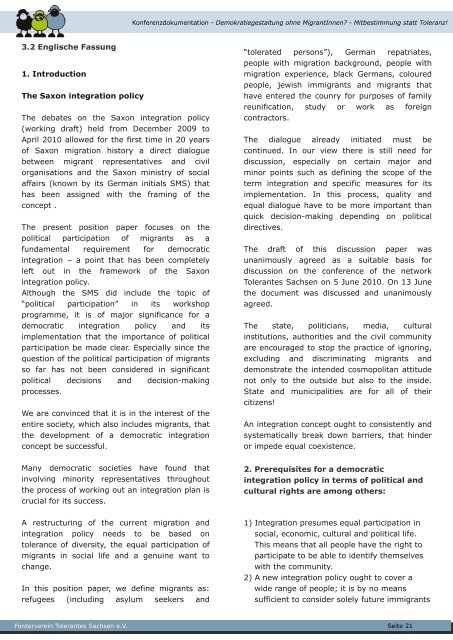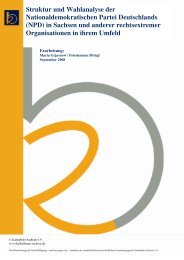Demokratiegestaltung ohne MigrantInnen? Mitbestimmung statt ...
Demokratiegestaltung ohne MigrantInnen? Mitbestimmung statt ...
Demokratiegestaltung ohne MigrantInnen? Mitbestimmung statt ...
Sie wollen auch ein ePaper? Erhöhen Sie die Reichweite Ihrer Titel.
YUMPU macht aus Druck-PDFs automatisch weboptimierte ePaper, die Google liebt.
3.2 Englische Fassung<br />
1. Introduction<br />
The Saxon integration policy<br />
The debates on the Saxon integration policy<br />
(working draft) held from December 2009 to<br />
April 2010 allowed for the first time in 20 years<br />
of Saxon migration history a direct dialogue<br />
between migrant representatives and civil<br />
organisations and the Saxon ministry of social<br />
affairs (known by its German initials SMS) that<br />
has been assigned with the framing of the<br />
concept .<br />
The present position paper focuses on the<br />
political participation of migrants as a<br />
fundamental requirement for democratic<br />
integration – a point that has been completely<br />
left out in the framework of the Saxon<br />
integration policy.<br />
Although the SMS did include the topic of<br />
“political participation” in its workshop<br />
programme, it is of major significance for a<br />
democratic integration policy and its<br />
implementation that the importance of political<br />
participation be made clear. Especially since the<br />
question of the political participation of migrants<br />
so far has not been considered in significant<br />
political decisions and decisionmaking<br />
processes.<br />
We are convinced that it is in the interest of the<br />
entire society, which also includes migrants, that<br />
the development of a democratic integration<br />
concept be successful.<br />
Many democratic societies have found that<br />
involving minority representatives throughout<br />
the process of working out an integration plan is<br />
crucial for its success.<br />
A restructuring of the current migration and<br />
integration policy needs to be based on<br />
tolerance of diversity, the equal participation of<br />
migrants in social life and a genuine want to<br />
change.<br />
In this position paper, we define migrants as:<br />
refugees (including asylum seekers and<br />
Förderverein Tolerantes Sachsen e.V.<br />
Konferenzdokumentation <strong>Demokratiegestaltung</strong> <strong>ohne</strong> <strong>MigrantInnen</strong>? <strong>Mitbestimmung</strong> <strong>statt</strong> Toleranz!<br />
“tolerated persons”), German repatriates,<br />
people with migration background, people with<br />
migration experience, black Germans, coloured<br />
people, jewish immigrants and migrants that<br />
have entered the counry for purposes of family<br />
reunification, study or work as foreign<br />
contractors.<br />
The dialogue already initiated must be<br />
continued. In our view there is still need for<br />
discussion, especially on certain major and<br />
minor points such as defining the scope of the<br />
term integration and specific measures for its<br />
implementation. In this process, quality and<br />
equal dialogue have to be more important than<br />
quick decisionmaking depending on political<br />
directives.<br />
The draft of this discussion paper was<br />
unanimously agreed as a suitable basis for<br />
discussion on the conference of the network<br />
Tolerantes Sachsen on 5 June 2010. On 13 June<br />
the document was discussed and unanimously<br />
agreed.<br />
The state, politicians, media, cultural<br />
institutions, authorities and the civil community<br />
are encouraged to stop the practice of ignoring,<br />
excluding and discriminating migrants and<br />
demonstrate the intended cosmopolitan attitude<br />
not only to the outside but also to the inside.<br />
State and municipalities are for all of their<br />
citizens!<br />
An integration concept ought to consistently and<br />
systematically break down barriers, that hinder<br />
or impede equal coexistence.<br />
2. Prerequisites for a democratic<br />
integration policy in terms of political and<br />
cultural rights are among others:<br />
1) Integration presumes equal participation in<br />
social, economic, cultural and political life.<br />
This means that all people have the right to<br />
participate to be able to identify themselves<br />
with the community.<br />
2) A new integration policy ought to cover a<br />
wide range of people; it is by no means<br />
sufficient to consider solely future immigrants<br />
Seite 21



